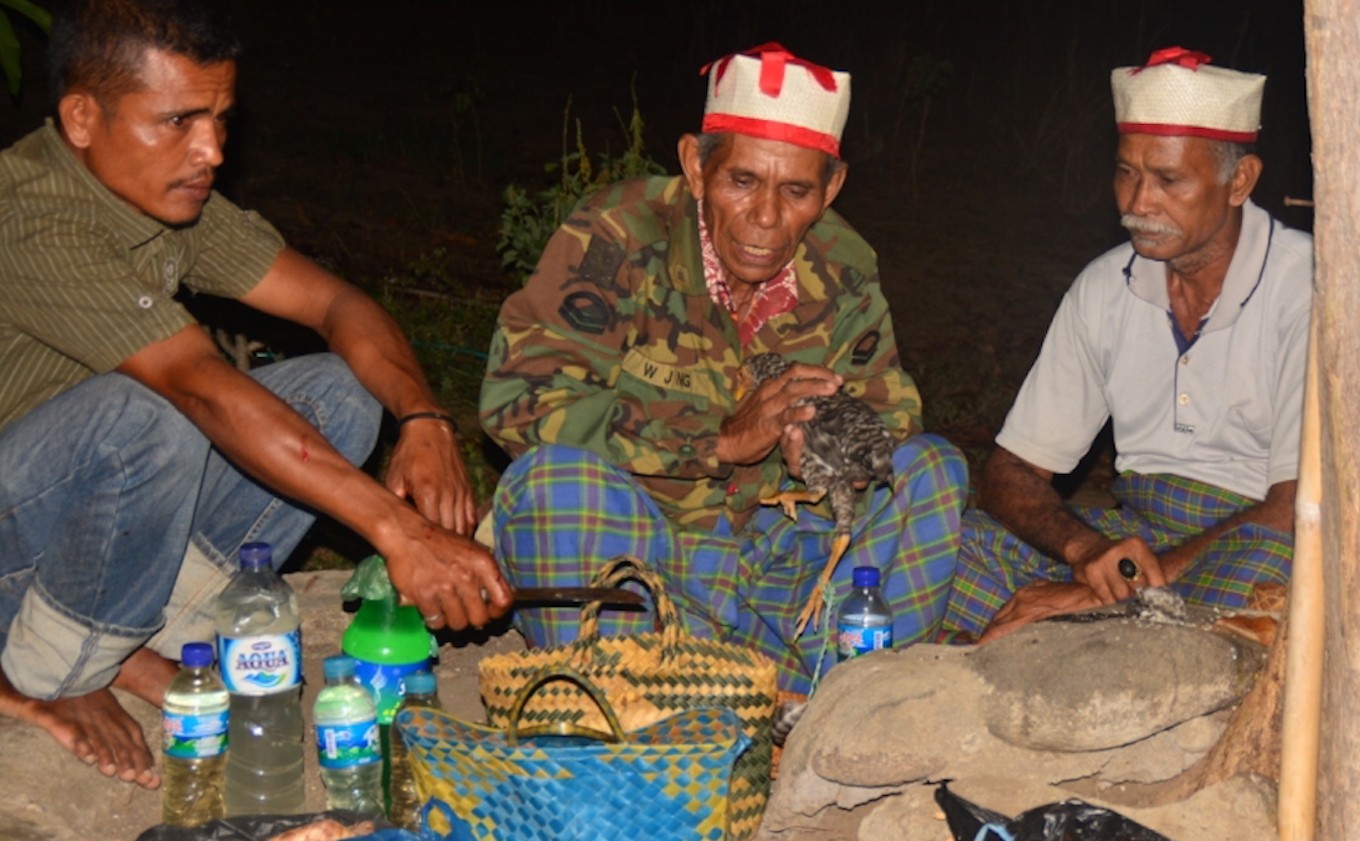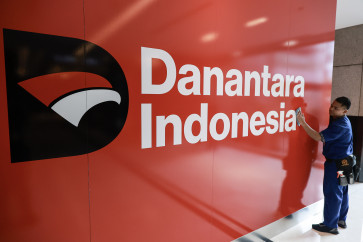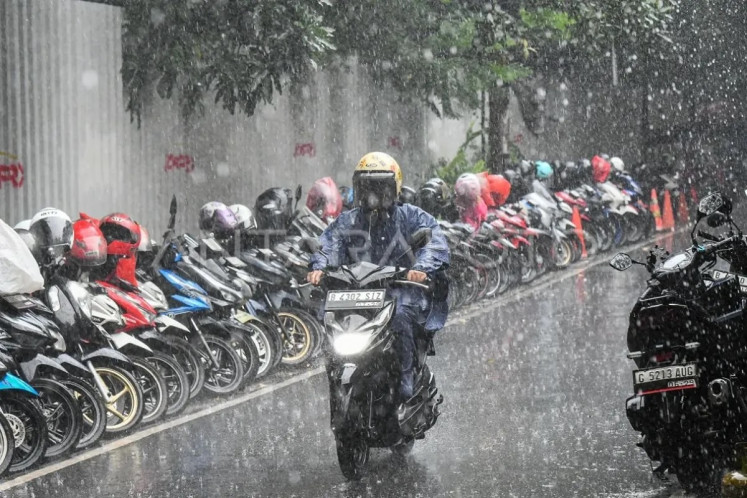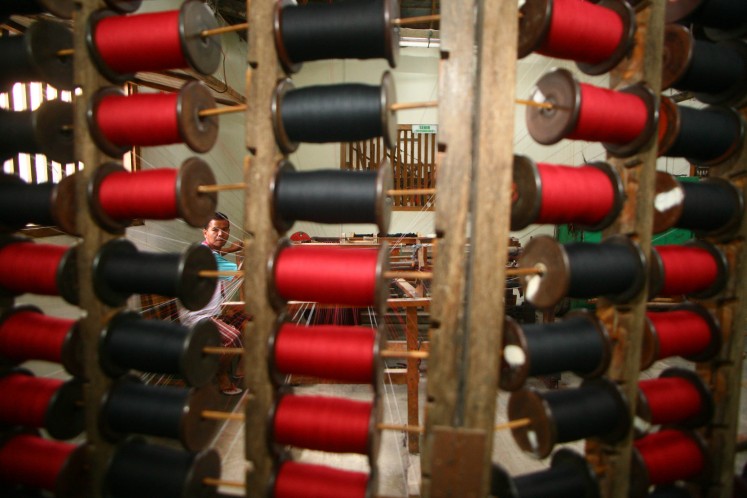Popular Reads
Top Results
Can't find what you're looking for?
View all search resultsPopular Reads
Top Results
Can't find what you're looking for?
View all search resultsAn insight into the Rongga tribe's ancient Mbasa Wini ritual
The Mbasa Wini (blessing ritual) is held annually by the traditional leaders of Maghileko and Kajukaro village and the villagers are prohibited from planting the seeds before the ritual is completed.
Change text size
Gift Premium Articles
to Anyone
B
lood dripping from an ayam kampung (village chicken) slain by the traditional leaders of the Rongga tribe in Maghileko and Kajukaro village, Watunggene administrative village, Kota Komba district, East Manggarai regency, Flores, NTT, Wednesday evening, marks the blessing of paddy and corn seeds on the Watu Naga (stone altar) in the center of the village. The chicken blood is splashed repeatedly on the paddy and corn seeds prepared by the farmers of Maghileko and Kajukaro village.
The Mbasa Wini (blessing ritual) is held annually by the traditional leaders of Maghileko and Kajukaro village and the villagers are prohibited from planting the seeds before the ritual is completed. Any violation to the rule will cost the villagers a fine, or a disaster in the land. Mbasa Wini is held before every planting season, which falls between September and December.
(Read also: East Nusa Tenggara markets own rice called Flobamora)
The announcement for the upcoming Mbasa Wini ritual is announced a year earlier by the traditional leaders. This year’s ritual takes place in October and on the morning of Oct. 5, the Gagi Nua (traditional village leader) of Maghileko and Kajukaro village, Yoseph Neja, announced that the Mbasa Wini would take place at dusk in the village’s Watu Naga.
“We prepare rice, chicken, wood, money and tuak (a local alcoholic beverage) for the ritual. The villagers also bring corn and paddy seeds to be blessed by the traditional leaders on the altar before they plant the seeds in their own land, be it within the village or in other places,” he explained.
“The natural signals are received by the elders in the Maghileko and Kajukaro village and the main signal is the rain at the end of September. The first rainfall that month signals that the dry lands in the villages are ready to be implanted with corn and paddy seeds,” he adds.
The Mbasa Wini ritual is a legacy from the Rongga tribe.
“The Mbasa Wini is a legacy that needs to be preserved. If we fail to preserve it, nature and our ancestors will not give us good harvests. This has been proven and the villagers of Maghileko and Kajukaro have experienced this several years ago. We are very obedient in conducting the traditional unwritten rules that are real in real life,” Yoseph said.
At dusk, hundreds of villagers from the two villages started to swarm around the Watu Naga, leaving behind their daily routines at home, taking their children to watch the ritual. At 8 p.m. sharp, Frans Arus, a traditional leader of the Rongga tribe, commenced the ritual by holding up the chicken while reciting prayers in the traditional Rongga language, asking for blessings from the tribe’s ancestors, nature and God, so that the newly-planted seeds will be pest-free and so that there will be good harvest.
“Outsiders who happen to live within the two villages must obey the Rongga tribe’s traditional rituals, especially Mbasa Wini. Everyone, from farmers to office workers must be involved in the ritual, as togetherness, solidarity and unity is reflected in the Mbasa Wini,” Frans explained. He also said the ritual was not influenced by developments in agricultural technology. The ritual even blessed the modern farming tools owned by the villagers.
Mama Kornelya Jaghung, one of the respected female figures of the Rongga tribe, told The Jakarta Post that women of the two villages had always been actively involved in the ritual.
“Together we prepare the ritual. We cook bambu kolo (rice cooked in bamboo) and also prepare the corn and paddy seeds to be blessed with the chicken blood,” she said.
(Read also: Rio Febrian presents the sound of eastern Indonesia)
Remigius Gaut, chief executive of education and culture in Kota Komba district, East Manggarai regency, attended the event and explained his wish to get youngsters involved in the tradition.
“Students from both Maghileko and Kajukaro village should understand and attend this yearly ritual. This legacy from our ancestors must be preserved,” he said.
Remigius also stated that the educational body in East Manggarai had a specific local curriculum that taught local children their local culture and heritage.
The Mbasa Wini ritual ends with songs and dances, where the women and men dance in circles, and pass a scarf to one another. (asw)







